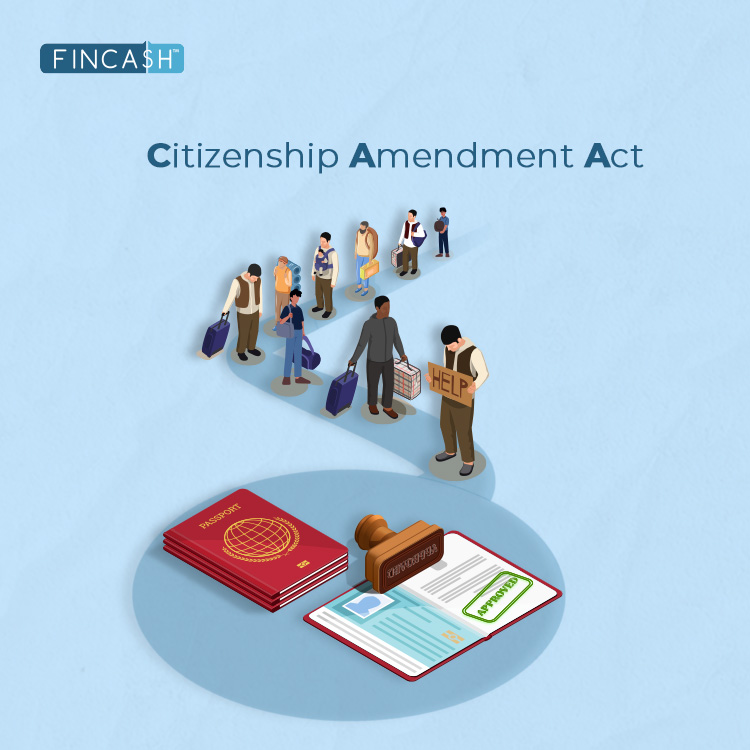
Table of Contents
What is the Citizen Amendment Act (CAA)?
CAA stands for the "Citizen Amendment Act." Initially introduced in the Lok Sabha on July 19, 2016, this legislation proposes an amendment to the Citizenship Act of 1955. It aims to grant Indian citizenship to illegal migrants from various religious backgrounds, including Hindus, Jains, Christians, Parsis, Buddhists, and Sikhs, originating from neighbouring countries such as Afghanistan, Pakistan, and Bangladesh, provided they arrived in India on or before December 31, 2014.

The Bill was passed in the Lok Sabha on January 8, 2019, and subsequently in the Rajya Sabha on December 11, 2019. However, it faced extensive criticism for being perceived as discriminatory based on religion, leading to various protests such as the CAA Protests, Citizenship Amendment Bill (CAB) Protests, and the CAA and National Register of Citizens (NRC) Protests.
Prevention of Obtaining Indian Citizenship by Illegal Immigrants
It is prohibited for individuals who are considered illegal migrants to acquire Indian citizenship. An illegal migrant is defined as someone who enters India unlawfully, lacking valid visa approval or proper documentation. Such individuals may have initially entered the country legally but overstayed beyond the duration specified in their visa applications and travel documents. In India, unlawful migrants may face various penalties, including punishment, arrest, fines, lawsuits, charges, expulsion, or imprisonment.
The government has protected certain categories of illegal migrants from being arrested or expelled, as evidenced by September 2015 and July 2016 measures. These include individuals who entered the country from Afghanistan, Bangladesh, or Pakistan before or on December 31, 2014. They identify themselves as belonging to religious groups such as Hinduism, Sikhism, Buddhism, Jainism, Parsi, or Christianity.
Check Here!
Important Provisions of the Citizenship Amendment Bill 2019
Here are some key provisions of the CAA Bill 2019 -
The Bill amends the Citizenship Act to provide provisions for migrants from Hinduism, Sikhism, Buddhism, Jainism, Parsis, and Christianity communities from neighbouring countries like Afghanistan, Bangladesh, and Pakistan who entered the country before or on December 31, 2014. These migrants are exempted from being considered unlawful migrants.
To avail of this benefit, individuals must have been exempted by the central government from the Passport Act of 1920 and the Foreigners Act of 1946.
The 1920 Act mandates immigrants to possess a passport, while the 1946 Act governs foreigners' entry and exit from India.
Citizenship can be obtained through registration or naturalisation, provided the individual meets specific criteria. For instance, if a person resides in India for a year and has at least one parent who was formerly an Indian citizen, they can apply for citizenship through registration.
One of the prerequisites for obtaining citizenship through naturalisation is that the person must have resided in India or served the central government for at least 11 years before seeking citizenship. However, the Bill makes an exception for Hinduism, Sikhism, Buddhism, Jainism, Parsis, and Christianity communities from Afghanistan, Bangladesh, and Pakistan, reducing the residency requirement to five years.
Upon acquiring citizenship, individuals are considered citizens from the day of their admission into the nation, and any legal records about their unlawful migration or nationality are concluded and terminated.
The amended act's applicability excludes tribal territories of Assam, Meghalaya, Mizoram, and Tripura, listed in the Sixth Schedule of the Constitution, covering areas such as Assam's Karbi Anglong, Meghalaya's Garo Hills, Mizoram's Chakma District, and Tripura's Tribal regions.
The act also does not extend to "Inner Line" territories regulated by the Bengal Eastern Frontier Regulation of 1873, where the Inner Line Permit administers Indian access.
The central government reserves the right to cancel the recording of Overseas Citizen of India (OCI) Cardholders under specific circumstances, including registration by deception, conviction of two years or more within five years after registration, or when it is deemed essential for India's territorial sovereignty and regional security.
Connection of CAA to NRC
The National Register of Citizens (NRC) is a comprehensive record of all lawful citizens. A 2003 amendment to the Citizenship Act mandated its establishment and upkeep. As of January 2020, the NRC was only operational in certain states like Assam, yet the BJP has pledged to extend its implementation nationwide as per its electoral promises. By documenting all legally recognised citizens, the NRC aims to identify those lacking documentation, potentially categorising them as illegal immigrants or "foreigners." However, the Assam NRC experience reveals that many individuals were labelled "foreigners" due to insufficient documentation. There are concerns that the current Citizenship Act amendment provides a protective "shield" for non-Muslims, who can claim refuge from persecution in Afghanistan, Pakistan, or Bangladesh. In contrast, Muslims are not afforded the same privilege.
Concerns Regarding CAA
CAA is not devoid of issues and concerns. Here are some of the major concerns regarding this Bill:
- This legislation excludes Jews and atheists.
- It fails to address illegal migrants from other neighbouring nations of India, including Nepal, Bhutan, and Myanmar.
- The rationale behind the selected time frame in this legislation remains undisclosed.
- The focus solely on religious persecution is evident, as it does not include the Muslim religion alongside the other six religions. This omission has sparked numerous protests.
Conclusion
The CAA aims to revise the definition of illegal migrants outlined in the Citizenship Act 1955. While the Citizenship Act of 1955 allows for citizenship acquisition through five avenues—by descent, birth, registration, naturalisation, and annexation—CAA extends this provision specifically to persecuted minorities belonging to the six mentioned religions. Notably, the Muslim religion is not included among the six religions, which has led to significant protests and controversies.
All efforts have been made to ensure the information provided here is accurate. However, no guarantees are made regarding correctness of data. Please verify with scheme information document before making any investment.












